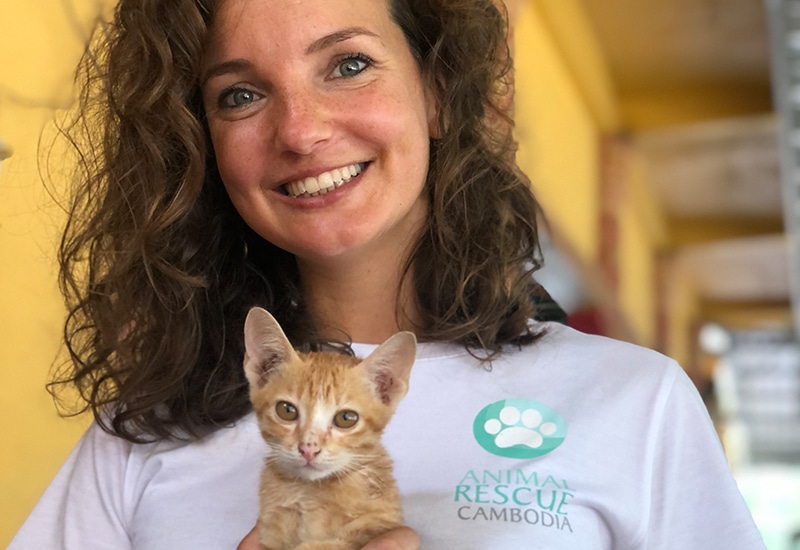ចុចត្រង់នេះដើម្បីអានអត្ថបទជាភាសាខ្មែរ។
Are you thinking of adding a furry friend to your family? But maybe you are not sure yet how it will impact your daily life or you need to convince your family/partner? Whatever the reason may be that you are hesitant, responsibly fostering a rescue animal is a great way to get started. Do a good deed and add joy to your life at the same time. Sounds good, doesn’t it?
In this article, Animal Rescue Cambodia (ARC) explains what fostering an animal is, the benefits for individuals, couples, and families as well as three heartwarming foster success stories to inspire you.
Are you ready? We’re quite sure that by the end of this article you won’t think twice about joining our ARC family of FANTASTIC FOSTER FAMILIES! ;-)
What is Animal Fostering?
First of all, pet fostering means providing temporary care to rescue animals until they are adopted into forever homes.
When homeless and/or sick street animals are saved by individuals and brought to animal rescue organizations like ARC, these kittens, puppies, cats, and dogs are medically treated at the center and rehabilitated until they are ready to find their permanent adoption home.
Every shelter has limits as to how many animals it can care for (space, staff, funds, expertise). In order to keep as much space and resources available to care for rescue animals, shelters need the help of fosters. Fostering is a great way to help shelters and provide a loving home for these cats and dogs until they can move to their adoption home.
Besides, baby animals including kittens and puppies easily catch diseases, and housing in a shelter increasingly exposes them to viruses and bacteria no matter how hygienically the shelter operates. Since so many sick animals come through a shelter’s doors, young animals can easily get sick due to their weak immune system and vaccination status. Shelter Medicine experts recommend that shelters never house baby animals, in order to keep them safe. Foster homes are an excellent option for these animals.
Basically, we can distinguish between short-term and long-term foster care:
Short term foster (a few weeks to a few months)
- kittens/puppies who are too young for adoption
- cats/dogs who are highly stressed at the center/in the presence of other animals
- animals who need special socialization/behavior training from experienced fosters
- animals who require short term treatments but do not require hospitalization
Long term foster (1 year or longer)
- for adult cats/dogs, both healthy and special-needs animals
- retirement homes
So, isn’t fostering basically the same as adopting an animal?
Difference between Fostering and Adopting an Animal
Fostering a rescue animal is temporary (short or long term) while adopting a rescue animal is a commitment to responsibly care for the animal throughout his/her lifetime.
Does this mean I have to adopt the foster kitten/cat/dog at the end of the foster term? Of course, you don’t have to, but you are more than welcome to do so, if you like, and if you are able to provide a FUR-EVER home responsibly.
9 Great Reasons to Foster a Rescue Animal
In case you still need convincing, here are the great benefits of adding a foster pet to your family:
- You save a precious life from neglect & suffering in the streets
- Fostering a pet is cheaper than buying one from a breeder
- Doing this good deed gets you A LOT of good karma points for helping an animal
- Contribute to reducing the number of homeless animals
- A shelter space opens up so that animal rescue organizations like ARC can help more homeless animals in need
- Enjoy having a pet in your family for a limited period of time, if you can’t adopt a cat or dog due to lifestyle or other circumstances
- You can help to train and socialize a rescue animal to increase his/her adoption potential
- Meet new people when walking your foster dog or sharing stories about your foster cat
- Fostering an animal is a great way to “test” if you are ready to adopt a pet
That sounds great! So, if I decide to foster a rescue animal, what are my responsibilities exactly?
Responsibilities of Foster Family and the Rescue Center
Foster families work hand in hand with the rescue center. While individual tasks and services may slightly differ from rescue center to rescue center, at ARC we have divided the responsibilities for the foster animal as follows:
Foster Family
- Adequate home and shelter
- Healthy food and water
- Love and cuddles
- Playing, exercise, walks
- Socialization and training like potty training, clicker training, etc.
- Transport the animal to ARC for check-ups and treatments
Animal Rescue Cambodia
- FREE basic medical treatment (desexing, vaccinations, microchipping)
- FREE advanced medical treatments, if required
- FREE medical checkups including dental care
- FREE medical and animal behavior advice
- FREE animal boarding when you are traveling (up to 3 weeks)
So, what’s next?
How to Become a Pet Foster Family
While every animal rescue organization has its own policies, at ARC volunteer fosters need to fulfill the following requirements
- At least 21 years old
- Enough time and space
- Basic knowledge of the species’ needs
- Cooperation of other people in the same household
Do you have some more information on how I can imagine living with a rescue foster pet?
Fostering Rescue Animals – Personal Success Stories
Now that you know what pet fostering is, let us take a closer look at some foster families. Let’s hear about fostering rescue animals directly from them! ;-)
- Dog Foster – The Story of Helen & Her Family
- Kitten Squad – Saving Neonatal Bottle Babies (Mnandi & Minxy)
What to expect when fostering an animal
Here is what you can typically expect with a new furry family member, and a few what you can do to make it easier for everybody:
FIRST 3 DAYS
- he/she may feel scared, nervous, or restless; he/she may refuse to eat/drink, or act out (test boundaries)
- give them space, stay calm, and establish routines (positive reinforcement)
AFTER 3 WEEKS
- he/she is settling in, building trust, showing their personality, learning family rules and routines
- teach basic commands & house rules, stick to routines
AFTER 3 MONTHS
- he/she feels comfortable and safe, understands the house rules, feels at home, establishes a bond with his/her new family
- remain consistent, patient, loving
At ARC, we don’t leave you alone. First, we help you to select a pet that really suits your family, lifestyle, and environment. Secondly, we help you with tips and advice, in case you encounter any challenges.
What’s Next?
Join our ARC family of FANTASTIC FOSTERS today!
- Send us a Facebook Message: www.facebook.com/animalrescuecambodia
- Phone/WhatsApp/Telegram us: 012 340 114 (English, Khmer)
- Email us: info@ar-cambodia.com
- Find out more: https://ar-cambodia.com/adoption
Or head on over to our friends at Ministry of Cat: Rescue Cat Cafe & Adoption Center to get a yummy coffee and delicious snack while “test-cuddling” with the cats for fostering.

